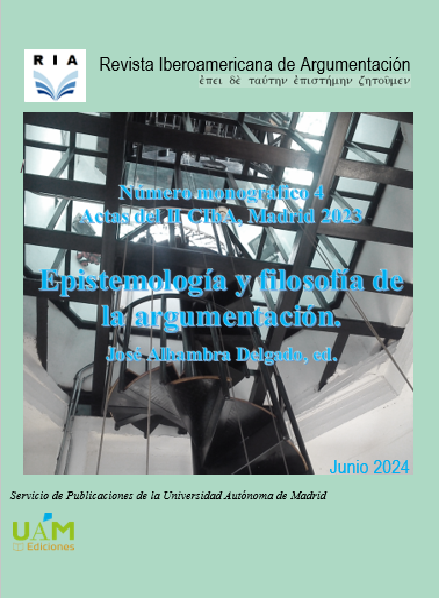Keywords:
bicondionality, causality, conditional arguments, conditional perfection, deductive reasoning, neutralityCopyright (c) 2024 Revista Iberoamericana de Argumentación

This work is licensed under a Creative Commons Attribution-NonCommercial-NoDerivatives 4.0 International License.
Abstract
This research studies the main differences between causal, neutral, and arbitrary content in biconditional interpretations with factual scenarios. Our goal is to demonstrate that people evaluate the semantic content of conditional statements rather than following logical formulations when reasoning with conditional arguments. The phenomenon of Conditional Perfection occurs when people prefer a biconditional interpretation over a conditional one when the scenario warrants it, for this reason we have experimentally manipulated the content and scenarios of the statement to modulate the acceptance of conditional arguments such as modus ponens, modus tollens, affirmation of the consequent, and denial of the antecedent.
Downloads
References
Byrne, R. & Tasso, A. (1999). “Deductive reasoning with factual, possible, and counterfactual conditionals”. Memory and Cognition, 27, 726–740. https://doi.org/10.3758/BF03211565
Byrne, R. M. (2005). The Rational Imagination: How people create alternatives to reality. MIT Press. ISBN 978-0-262-02584-3.
De Neys, W., Schaeken, W. & D’Ydewalle, G. (2002). “Causal conditional reasoning and semantic memory retrieval: A test of the semantic memory framework”. Memory and Cognition 30, 908–920. https://doi.org/10.3758/BF03195776
Gauffroy, C. & Barrouillet, P. (2014). “Conditional reasoning in context: A developmental dual process account”. Thinking & Reasoning, 20, 372–384. https://doi.org/10.1080/13546783.2013.853695
Geis, M. & Zwicky, A. (1971). “On invited inferences”. Linguistic Inquiry, 2, 561–566. http://www.jstor.org/stable/4177664
Godden, D. & Zenker, F. (2015). “Denying Antecedents and Affirming Consequents: The state of the art”. Informal Logic, 35 (1). https://doi.org/10.22329/il.v35i1.4173
Goldstein, E. B. (2011). Cognitive psychology (3rd ed.). Belmont, CA: Wadsworth.
Horn, L. (2000). “From If to Iff: Conditional perfection as pragmatic strengthening”. Journal of Pragmatics 32, 289–326. https://doi.org/10.1016/S0378-2166(99)00053-3
Johnson-Laird, P. (2008). How we reason. Oxford: Oxford University Press. https://doi.org/10.1093/acprof:oso/9780199551330.001.0001
Johnson-Laird, P. & Byrne, R. M. (2002). “Conditionals: A Theory of Meaning, Pragmatics, and Inference”. Psychological Review, 109 (4), 646–678. https://doi.org/10.1037/0033-295X.109.4.646
Johnson-Laird, P. N., Byrne, R. M., & Schaeken, W. (1992). “Propositional reasoning by model”. Psychological Review, 99(3), 418–439. https://doi.org/10.1037/0033-295X.99.3.418
Khemlani, S.S., R. Byrne, R. M. & Johnson-Laird, P.N. (2018). “Facts and Possibilities: A Model-Based Theory of Sentential Reasoning”. Cognitive Science 42, 1887–1924, or 1-38. https://doi.org/10.1111/cogs.12634
López-Astorga, M. (2014). “¿Podemos evitar la perfección del condicional enfocando el antecedente o son necesarios antecedentes alternativos?”. Revista signos. Estudios de Lingüística, PUCV, Chile, 47 (85), 267–292. https://doi.org/10.4067/S0718-09342014000200006
Matalon, B. (1962). “Etude Génétique de l’Implication”, in Etudes d’Epistemologie Génétique XVI. Implication, Formalisation et Logique Naturalle. Paris: P.U.F.
Moldovan, A. (2009). “Pragmatic Considerations in the Interpretation of Denying the Antecedent”. Informal Logic, 29 (3), 309–326. https://doi.org/10.22329/il.v29i3.2846
Orenes, I., Madruga, J., Vega, I., Espino, O. & Byrne, R. M. (2019). “The Comprehension of Counterfactual Conditionals: Evidence from Eye-Tracking in the Visual World Paradigm”. Frontiers in Psychology, 10, 1172. https://doi.org/10.3389/fpsyg.2019.01172
Quinn, S. & Markovits, H. (1998). “Conditional reasoning, causality, and the structure of semantic memory: strength of association as a predictive factor for content effects”. Cognition 68, B93–B101. https://doi.org/10.1016/S0010-0277(98)00053-5
Rips, L. J. (1983). “Cognitive processes in propositional reasoning”. Psychological Review, 90, 38–71.
Thompson, V. & Byrne, R. M. (2002). “Reasoning about things that didn’t happen”. Journal of Experimental Psychology: Learning, Memory, and Cognition, 28, 1154–1170. https://doi.org/10.1037/0278-7393.28.6.1154
Van der Auwera, J. (1997). “Pragmatics in the last quarter century: the case of conditional perfection”. Journal of Pragmatics 27, 261–274.
Wason, P.C. & Johnson-Laird, P. N. (1972). Psychology of Reasoning: structure and content. London: B.T. Basford Ltd.. ISBN 0674721276, 9780674721272.
